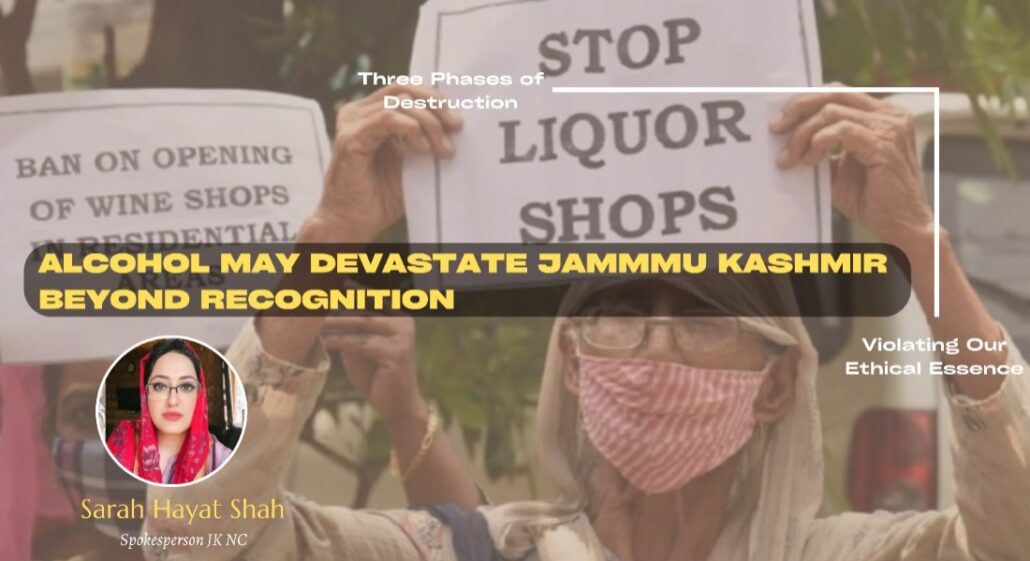
Sarah Hayat Shah
Although the majority of us in Kashmir associate an alcohol ban with Islamic traditions, it is startling how many non-Islamic nations have acknowledged alcohol’s adverse implications and sought to regulate its usage in the past.
I have had some anxious days since the JK administration recently issued orders to encourage the sale of alcohol in JK. I’ve been mulling over the issue in my thoughts and attempting to approach it from every possible perspective. In fact, I was so viscerally repulsed by this directive when I first saw it on social media that I immediately wrote my response, vehemently denouncing this move.
However, I soon came to the realisation that the national alcohol policy cannot be based solely on my beliefs. Perhaps I’m approaching the situation too cautiously now that society has advanced to new realities. Or if drinking is too much a matter of personal preference for society to have any influence at all?
But again, alcohol has long been at the centre of a number of societal problems, the burden of which falls not only on those who consume it in private but also on their partners, families, neighbours, coworkers, and society as a whole.
Arguments and counterarguments erupted like a volcano inside of me. I came to the realization that the best approach to assess the merit of this policy would be to understand how alcohol has been associated with societies in the past, particularly in those societies where anti-alcoholism is not ingrained in the religious or cultural ethos. The latter was because I didn’t want my religious prejudices towards them to taint my reasoning.
Three Phases of Destruction
The relationship between alcohol and society has always been a complicated one. But our reading of history tells us that it evolves in three well-defined and coherent phases, each successive phase creating a more complex web of problems in society than the previous one.
In the first phase where alcohol is somewhat ubiquitously available in society, it gives rise to immediate or primary issues, such as health, financial and societal. The most relevant case in point from our own country would be that of Bihar which some years back saw massive demonstrations against the sale of alcohol by women and social activists. Alcohol had scorched the social fabric of Bihar by adding an element of recklessness in familial relationships whose direct and disproportionate brunt fell on women and children. Due to its addictive properties, it had become a serious drain on the finances of individuals and their families, making them languish in poverty or becoming a prime motivator for crimes and robberies.
But freely available alcohol has another less visible effect that takes root and operates in the murky back alleys of society. This forms part of the second phase of our study, when a network of commercial stakeholders around alcohol is created, which amasses serious wealth and influence, and is often bolstered by corruption and bullying. This is necessary to protect interests, keep a firm grip on the market, spread the tentacles of the trade as wide as possible, and in the process ensure that society is awash with alcohol.
Gradually, society may enter the third and the most complicated phase, when authorities finally intervene and impose a decisive ban on the substance. For instance, on the back of the demonstrations in Bihar, alcohol was completely banned in 2016. But six years down the line, most experts believe that the efforts of the government have failed. Over the years, alcohol has entered the arteries of that society so deeply that the ban, instead of having a positive impact, has created new issues in its wake. The most problematic issue is the consumption of spurious alcohol which is produced by illegal, underground and completely unregulated operations. This continues to cause scores of deaths in the state now and then.
Over the years, the alcohol stakeholder network gets so strongly entrenched in society that it becomes extremely difficult for the authorities to clamp down on it. We can draw plenty of inferences from the American experience of Prohibition between 1920 and 1933. There was a sudden rise in organized crime and gang violence during this period (much of which was unfortunately glamourized by American cinema), meant to protect their respective bootlegging spheres. An underground economy soon started to flourish around secret drinking establishments and supply chains. After securing plenty of money and influence from the liquor trade, the activities of the bootleggers gradually expanded to other crimes such as racketeering, gambling, loan-sharking, prostitution, and extortion.
Violating Our Ethical Essence
For the sake of secular probity, I have made a conscious effort to only make historical, rather than religious arguments against alcohol. But these observations nevertheless are a clear demonstration of the eternal wisdom of my religion on the question of alcohol. It is amply clear that alcohol lies at the very heart of complex and often irreversible social problems.
India’s constitution recommends the prohibition of alcohol under Article 47 of the Directive Principles of State Policy. It is all the more surprising, therefore, to see this regime openly promoting alcohol in JK, in complete violation of the ethical essence of the constitution.
Although JK does not have a legal ban on alcohol at present, the active promotion of the substance by the regime is quite another thing. Our society has not yet entered any of the three phases I’ve described overhead. But as soon as we put a foot in the door, there is simply no going back!
By making alcohol commonplace, we will slowly but surely be taken down the road of immorality, organised crime, corruption, violence, shattered families, and scarred childhoods. The trade may give us significant returns in terms of tax revenues, but I’ll never be convinced that it would be worth all the accompanying pain, tears, and suffering.
Sarah Hayat Shah heads the IT/SM wing of JKNC.
(Note: The views expressed by the author are her own)




